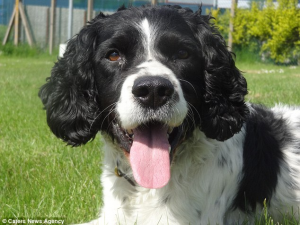If you have any comments on the site, or questions, then please use this page.
Month: February 2015
Problem: My Springer Will Not Stop Swimming
Recently I received an email from one of my followers:
Question
Phil,
Love your advice!
I have had springers 30 years. At present I have a 4 year old neutered male who is a great boy and plays like a puppy.
My concern: I live on the largest fresh water lake in the world. The temperature hovers around 50-55 degrees in the summer. Last year there were several coveys of ducks and Jack would not come out of the water after almost an hour. He is so intent a hunter I fear he could get hypothermia or drown.
Although he seemed in no distress it was scarry to say the least. Now I keep him on a long cable and of course no where as much fun as being free. What can I do?
Thank you, Barb I
Response
Here’s what I wrote back:
Hi Barb
Thanks for your interesting question, and your kind comments.
This is what I think you should do: If you don’t already use a dog whistle, get one.
When Jack is in the water (or out) use the whistle – one blow at time, a few minutes apart. When he does eventually come out, use the whistle once again and give him a treat – a treat he doesn’t usually get.
Over a few weeks you should be able to train him to associate the one blow with the treat, whether he is in the water or not. Don’t overdo it. Then as summer comes only use the whistle when he is in the water.
If you already use a dog whistle, then you’ll need to train him to respond to a special pattern of blows – maybe short-long-short.
That should sort him out.
Good luck!
A Common Problem
Springers just love the water, and one of mine lived to swim in the dock – a tidal dock. Late one evening he was heading out on the last of the tide with his best pal, my father’s Irish Setter (Milligan). They eventually swam ashore and landed on a mudbank…fine, but very muddy!
I’ve learned to put much more effort into training since that evening.
Dogs Read your Face and Know Whether you are Happy or Sad –
Facial expressions are essential in human communications. Without saying a word, we can signal to those around us to our emotional state—ranging from joy to sorrow—just by flexing a few facial muscles. Such expressions have evolved to help us form bonds, avoid danger and cooperate.
According to the results of a study published in Current Biology, dogs can read this silent method of communication and can distinguish between our angry and happy facial expressions. Tell me something new – most dog owners knew this already!
A Tight Bond between Man and Dog
Dogs and humans share a tight historical bond, which is why animal researchers from the University of Vienna focused on us for their research. Dogs are already known to be expert at reading us. We know that they can identify familiar faces – even if just part of the face is shown in a photograph. Whether they can actually read human emotions, however, was not proven until now
This seems to be the first time that researchers have shown that one animal species can recognise the emotions of another.
More research is planned – experiments with puppies could help us understand whether reading human facial expressions is something dogs learn as they mature, or if it’s something passed down in the genes.
Alfie the Springer Spaniel Sniffer Dog Retires with £11Million Haul
After 8 years, 400 arrests and a net haul of £11 million ($16 million), Alfie the springer spaniel sniffer dog has retired from Staffordshire Police.

Alfie was originally donated to the police by a family in Nottinghamshire after they found him to be too hyperactive. Ms Hargreaves, his handler, who has been in the police since she joined the cadets at 16, said: ‘He was way too much for an ordinary family – a bit overzealous and hyperactive – but that’s exactly what we look for in a search dog.
‘He is ball crazy and that’s the first thing we need – a dog who loves the reward of chasing a tennis ball.’
After being assessed by a team of officers, it was clear that he was perfect for the job and Alfie was inducted into the force with eight weeks of training with his handler. She said: ‘I was new to being a specialist dog handler too. Although I’d had a general purpose dog before, Alfie was my first search dog.
‘He’s turned out to be the finest dog the force has ever known.
During his eight years in the force, Alfie has sniffed out £8million in drugs alone, plus cash, guns and ammunition.
‘And Alfie has always been 100 per cent professional – that’s what makes him such a special dog – even when he was doing shift patterns. He did exactly the same hours as me, even when I was working nights or from the early hours of the morning.As soon as I put my uniform on, he was ready to work.’
Alfie retired in October and is being supported by the Staffordshire Retired Police Dogs Scheme now he is no longer in active service. Ms Hargreaves said: ‘Although I was very sad to see him retire I know he’ll enjoy his new home.
‘But I will be fundraising for the Staffordshire Retired Police Dogs Scheme to make sure he has a comfortable retirement.’
Full Story at the Daily Mail